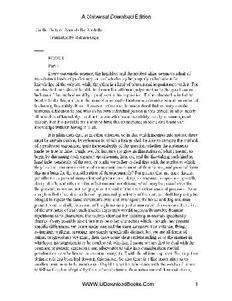
On The Parts Of The Animals PDF
92 Pages·2009·0.253 MB·English
Most books are stored in the elastic cloud where traffic is expensive. For this reason, we have a limit on daily download.
Preview On The Parts Of The Animals
Description:
On the Parts of Animals (or De Partibus Animalium) is a text by Aristotle. It was written around 350 BC. The Arabic translation of De Partibus Animalium comprises treatises 11-14 of the Kitāb al-Hayawān (The Book of Animals).Aristotle (384 BC – 322 BC) was a Greek philosopher, a student of Plato and teacher of Alexander the Great. He wrote on many subjects, including physics, metaphysics, poetry, theater, music, logic, rhetoric, politics, government, ethics, biology and zoology. Together with Plato and Socrates (Plato's teacher), Aristotle is one of the most important founding figures in Western philosophy. He was the first to create a comprehensive system of Western philosophy, encompassing morality and aesthetics, logic and science, politics and metaphysics. Aristotle's views on the physical sciences profoundly shaped medieval scholarship, and their influence extended well into the Renaissance, although they were ultimately replaced by modern physics. In the biological sciences, some of his observations were only confirmed to be accurate in the nineteenth century. His works contain the earliest known formal study of logic, which were incorporated in the late nineteenth century into modern formal logic. In metaphysics, Aristotelianism had a profound influence on philosophical and theological thinking in the Islamic and Jewish traditions in the Middle Ages, and it continues to influence Christian theology, especially Eastern Orthodox theology, and the scholastic tradition of the Roman Catholic Church. All aspects of Aristotle's philosophy continue to be the object of active academic study today. -Wikipedia
See more
The list of books you might like
Most books are stored in the elastic cloud where traffic is expensive. For this reason, we have a limit on daily download.
